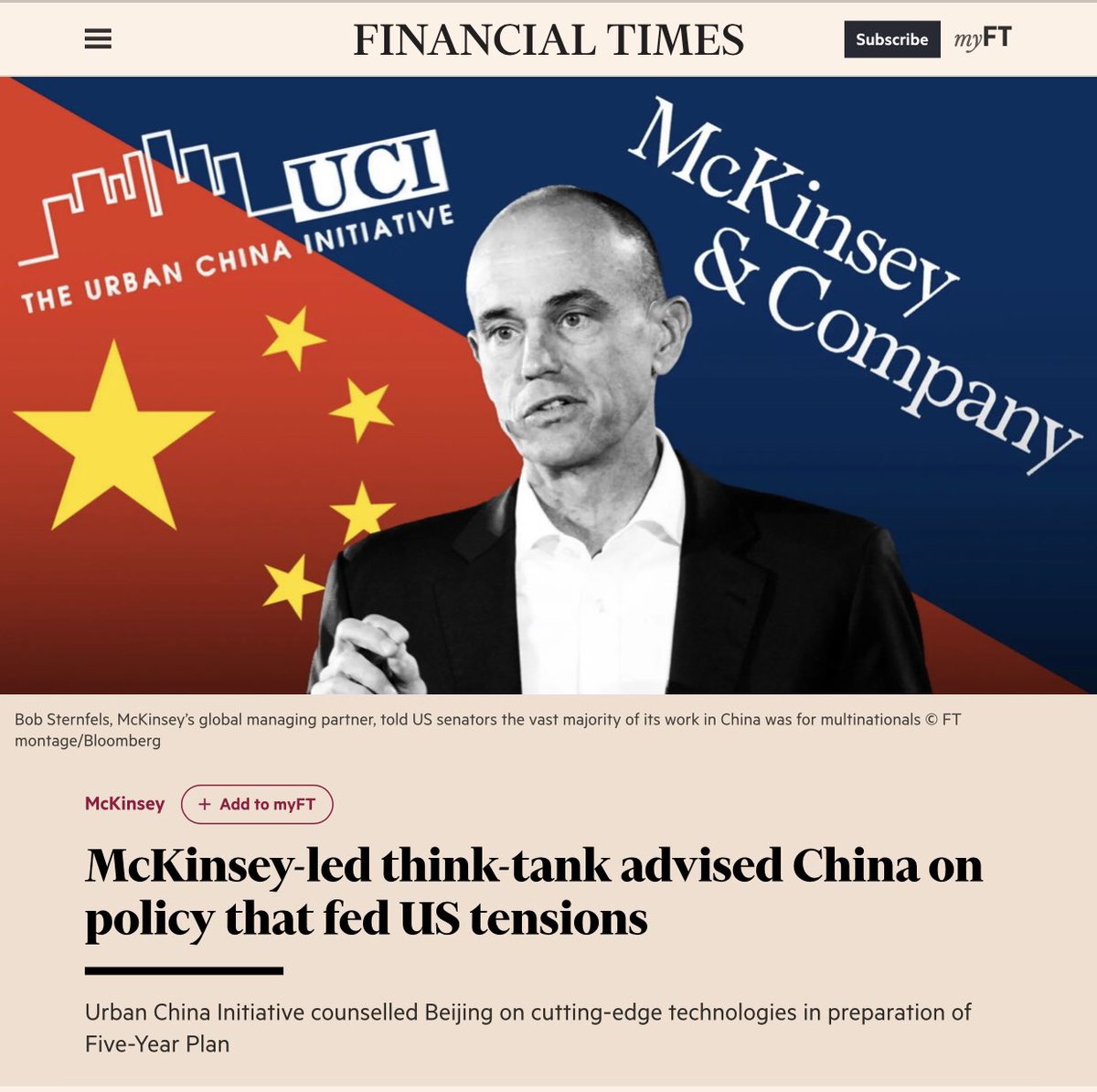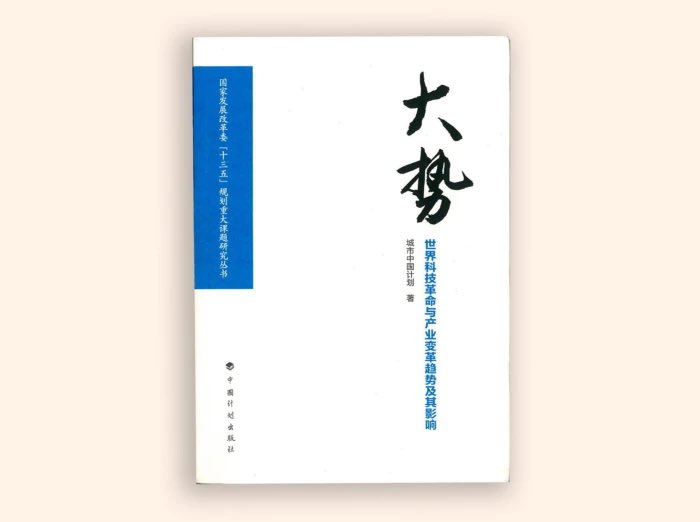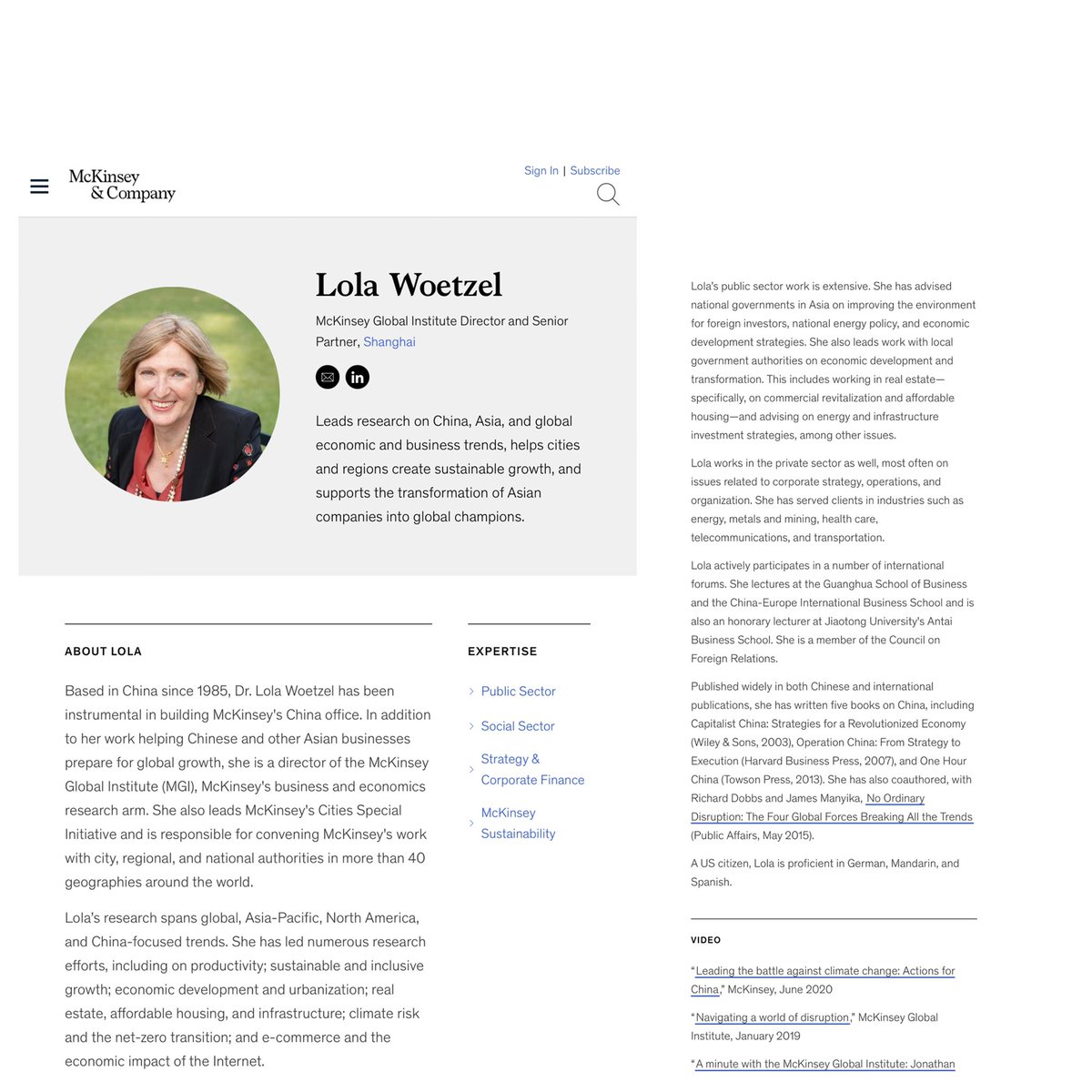You are using an out of date browser. It may not display this or other websites correctly.
You should upgrade or use an alternative browser.
You should upgrade or use an alternative browser.
McKinsey authored a 300-page book on how the CCP could dominate future war technology and gave it to China
- Thread starter WIA20XX
- Start date
More options
Who Replied?free market of ideas 
the U.S has squandered it's lead in many areas and let private equity decimate innovation so they could fleece people instead. the patent system has been abused too.
now U.S "leadership" in all their brilliance wanna shun the people whose ideas and plans have been proven to work.


the U.S has squandered it's lead in many areas and let private equity decimate innovation so they could fleece people instead. the patent system has been abused too.
now U.S "leadership" in all their brilliance wanna shun the people whose ideas and plans have been proven to work.

Last edited:
1/1
McKinsey-led think-tank Urban China Initiative advised China to deepen cooperation between business and the military and push foreign companies out of sensitive industries as part of a project for the central government in 2015.
The recommendations in the book “Scientific and Technological Revolutions around the World” (大势: 世界科技革命与产业变革趋势及其影响) by UCI, commissioned by National Development & Reform Commission, were among dozens of policies it proposed to boost technological prowess.
The UCI book — with a foreword by Lola Woetzel (one of McKinsey’s most senior partners in China) and drawing on work by McKinsey’s in-house research arm — formed part of the government’s research for its 13th Five-Year Plan covering 2016-20, which included “Made in China 2025”.
“Scientific and Technological Revolutions” claimed to provide “a road map to the opportunities for China’s science and technology development” during the 13th Five-Year Plan. It gave an overview of 14 technologies, from cloud computing to 3D printing to electric vehicles, that could help China achieve “dramatic productivity increases” as its investment-led growth model began to lose steam. China lagged behind advanced economies in these areas, but could catch up if Beijing pursued industrial policies including tax incentives and mandating the use of Chinese-made products in critical areas.
In all, it made 61 recommendations across 14 different technologies. One chapter covered advanced materials — a class of product including speciality metals and other materials used in cutting-edge manufacturing — where it recommended China accelerate the conversion of military technology into civil use and promote the two-way transfer and dissemination of military-civil material technology.
A reliance on foreign suppliers to build China’s cloud infrastructure could lead to the theft of sensitive data from military, economic and government departments and undermine national security, according to another chapter, so that the country should “strive to grow its domestic cloud computing industry and prevent core technologies from being controlled by foreign companies”.
The book also advocated for the government to provide more financial support for domestic internet of things companies so they could eventually take control of the industry from foreign firms.
The NDRC’s work on the 13th Five-Year Plan included an unprecedented level of foreign input. According to a 2015 speech by NDRC official Xu Lin, the government sought research from the OECD, the Asian Development Bank and “the famous American consulting firm McKinsey”, so as to “absorb a wide range of different viewpoints”. Among almost 100 research projects commissioned, Scientific and Technological Revolutions was one of the first two to be published by the NDRC.
Shanghai-based Lola Woetzel founded UCI in 2011 and co-chaired the initiative. She presented a personalized copy of the work to China’s then premier Li Keqiang at an NDRC symposium in Dec 2015. Woetzel has been based in China since 1985 and has been instrumental in building the firm’s presence in the country. She is one of six directors of the McKinsey Global Institute, the firm’s in-house research arm, a title she uses on the dust jacket to “Scientific and Technological Revolutions”, along with director of McKinsey & Company and co-chair of UCI.
In her foreword, Woetzel wrote: “Drawing on research of the McKinsey Global Institute and the Urban China Initiative, we hope this book provides useful input for the planning and development of China’s technology enterprises and government institutions. We believe there is great potential for China’s science and technology in the years to come!”
At a congressional hearing this month, McKinsey’s global managing partner Bob Sternfels denied allegations that McKinsey had done work for the CCP or for central government.
McKinsey-led think-tank advised China on policy that fed US tensions
To post tweets in this format, more info here: https://www.thecoli.com/threads/tips-and-tricks-for-posting-the-coli-megathread.984734/post-52211196
McKinsey-led think-tank Urban China Initiative advised China to deepen cooperation between business and the military and push foreign companies out of sensitive industries as part of a project for the central government in 2015.
The recommendations in the book “Scientific and Technological Revolutions around the World” (大势: 世界科技革命与产业变革趋势及其影响) by UCI, commissioned by National Development & Reform Commission, were among dozens of policies it proposed to boost technological prowess.
The UCI book — with a foreword by Lola Woetzel (one of McKinsey’s most senior partners in China) and drawing on work by McKinsey’s in-house research arm — formed part of the government’s research for its 13th Five-Year Plan covering 2016-20, which included “Made in China 2025”.
“Scientific and Technological Revolutions” claimed to provide “a road map to the opportunities for China’s science and technology development” during the 13th Five-Year Plan. It gave an overview of 14 technologies, from cloud computing to 3D printing to electric vehicles, that could help China achieve “dramatic productivity increases” as its investment-led growth model began to lose steam. China lagged behind advanced economies in these areas, but could catch up if Beijing pursued industrial policies including tax incentives and mandating the use of Chinese-made products in critical areas.
In all, it made 61 recommendations across 14 different technologies. One chapter covered advanced materials — a class of product including speciality metals and other materials used in cutting-edge manufacturing — where it recommended China accelerate the conversion of military technology into civil use and promote the two-way transfer and dissemination of military-civil material technology.
A reliance on foreign suppliers to build China’s cloud infrastructure could lead to the theft of sensitive data from military, economic and government departments and undermine national security, according to another chapter, so that the country should “strive to grow its domestic cloud computing industry and prevent core technologies from being controlled by foreign companies”.
The book also advocated for the government to provide more financial support for domestic internet of things companies so they could eventually take control of the industry from foreign firms.
The NDRC’s work on the 13th Five-Year Plan included an unprecedented level of foreign input. According to a 2015 speech by NDRC official Xu Lin, the government sought research from the OECD, the Asian Development Bank and “the famous American consulting firm McKinsey”, so as to “absorb a wide range of different viewpoints”. Among almost 100 research projects commissioned, Scientific and Technological Revolutions was one of the first two to be published by the NDRC.
Shanghai-based Lola Woetzel founded UCI in 2011 and co-chaired the initiative. She presented a personalized copy of the work to China’s then premier Li Keqiang at an NDRC symposium in Dec 2015. Woetzel has been based in China since 1985 and has been instrumental in building the firm’s presence in the country. She is one of six directors of the McKinsey Global Institute, the firm’s in-house research arm, a title she uses on the dust jacket to “Scientific and Technological Revolutions”, along with director of McKinsey & Company and co-chair of UCI.
In her foreword, Woetzel wrote: “Drawing on research of the McKinsey Global Institute and the Urban China Initiative, we hope this book provides useful input for the planning and development of China’s technology enterprises and government institutions. We believe there is great potential for China’s science and technology in the years to come!”
At a congressional hearing this month, McKinsey’s global managing partner Bob Sternfels denied allegations that McKinsey had done work for the CCP or for central government.
McKinsey-led think-tank advised China on policy that fed US tensions
To post tweets in this format, more info here: https://www.thecoli.com/threads/tips-and-tricks-for-posting-the-coli-megathread.984734/post-52211196



mastermind
Rest In Power Kobe
McKinsey’s only allegiance is with money.
ORDER_66
I am The Wrench in all your plans....
McKinsey’s only allegiance is with money.
...So he's a capitalist with no ethics.

China has the money, the tech and scientists to dominate but they have a very very bad habit of copying everyone else...

How Our Military Has Helped Push Ukraine Toward Defeat.
Ukrainian Corruption Plays its Part
The $60,000 Switchblade drone, produced in limited numbers due to cost, proved useless against armored targets and was quickly discarded by Ukrainian troops in favor of $700 Chinese commercial models ordered online.
No real point in being the smartest kid on the block if you can get consistently outworked by the dummies.

U.S. Remains Painfully Dependent on China for Silicon and Solar Panels | OilPrice.com
The Renewables MMI (Monthly Metals Index) continued its slight downward trend month-on-month, dropping by 3.8%.
The United States relies heavily on China for its solar panel supply.
Climate change? naw..
mastermind
Rest In Power Kobe
They have no ethics...So he's a capitalist with no ethics.
ORDER_66
I am The Wrench in all your plans....
Hood Critic
The Power Circle
McKinsey gets paid to consult and that's what they did. But lets not act like the State Department didn't get a copy.
But lets not act like the State Department didn't get a copy.
They were prolly on "background"
Fillerguy
Veteran
Save tiktok
